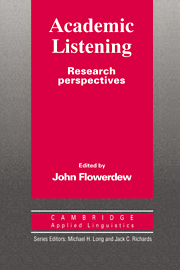Book contents
- Frontmatter
- Contents
- List of contributors
- Series editors' preface
- Acknowledgments
- Introduction
- I BACKGROUND
- II THE SECOND LANGUAGE ACADEMIC LISTENING PROCESS
- III DISCOURSE OF ACADEMIC LECTURES
- IV ETHNOGRAPHY OF SECOND LANGUAGE LECTURES
- V PEDAGOGIC APPLICATIONS
- Chapter 12 Evaluating lecture comprehension
- Chapter 13 Training lecturers for international audiences
- Conclusion
- Index
- Subject index
Chapter 13 - Training lecturers for international audiences
Published online by Cambridge University Press: 05 October 2012
- Frontmatter
- Contents
- List of contributors
- Series editors' preface
- Acknowledgments
- Introduction
- I BACKGROUND
- II THE SECOND LANGUAGE ACADEMIC LISTENING PROCESS
- III DISCOURSE OF ACADEMIC LECTURES
- IV ETHNOGRAPHY OF SECOND LANGUAGE LECTURES
- V PEDAGOGIC APPLICATIONS
- Chapter 12 Evaluating lecture comprehension
- Chapter 13 Training lecturers for international audiences
- Conclusion
- Index
- Subject index
Summary
Abstract
The growing number of non-native students at English-medium universities and colleges raises the issue of how such institutions can adjust to the needs of an international clientele. This chapter explores the implications of research for the (retraining of subject lecturers at institutions now catering for an ethnically and linguistically more diverse population. It discusses findings from listening comprehension research, lecture discourse analysis in general and second language lecture studies in particular, and argues that much of the available research has focussed on spoken discourse as input. Drawing on research into native/nonnative classroom communication and on the lecturing methodology literature, the chapter suggests that programmes to train lecturers for international audiences should also raise awareness of the need to make clear the sociocultural rules of the host academic context and of the benefits of adjusting lecture presentation to increase the degree of interaction between speaker and audience. The importance for international classes of two particular aspects of lecturer performance is discussed: the selection of culturally accessible examples when giving explanations and the management of audience questions. The chapter concludes that methodological programmes of the sort illustrated here would bring benefits for international and home students alike.
Introduction
Over the last two decades political, educational and economic circumstances have led to an increase in the number of international students attending L2-medium courses in tertiary education institutions, not only in the principal English-speaking countries (Australia, Britain, Canada, New Zealand and the United States) but also, for example, in the European countries participating in the ERASMUS and TEMPUS exchange schemes.
- Type
- Chapter
- Information
- Academic ListeningResearch Perspectives, pp. 269 - 289Publisher: Cambridge University PressPrint publication year: 1995
- 2
- Cited by



